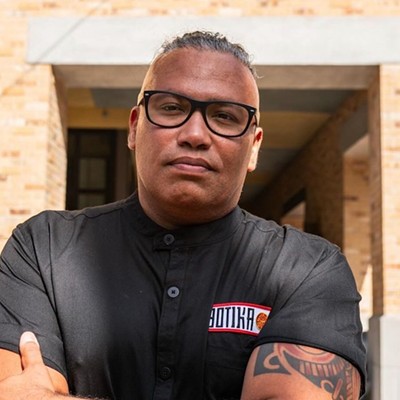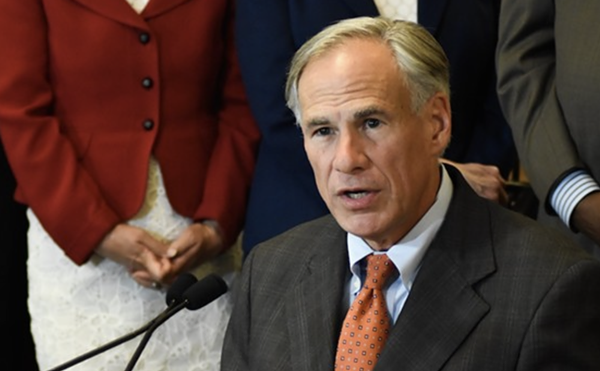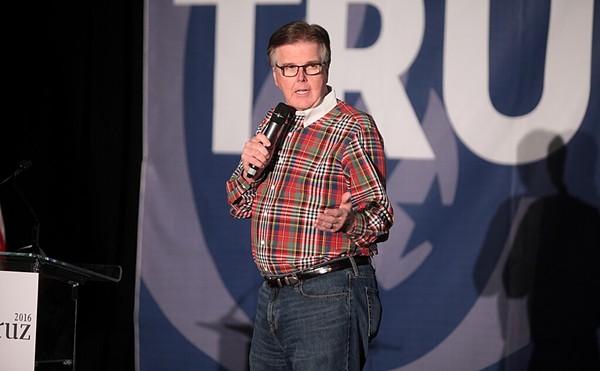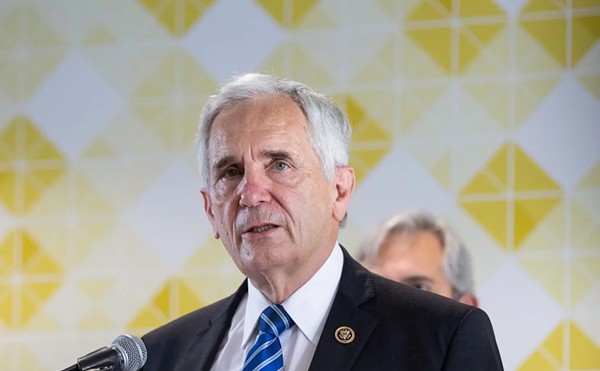The story of Dr. Hector P. Garcia is the stuff of legends. The World War II veteran returned from Europe in 1946 to witness injustice all around him. In Corpus Christi, he and his fellow Mexican-American veterans faced segregation from their peers. They saw whites-only funeral homes refusing to bury Latino war heroes, poll taxes that kept poor minorities from voting, and an infamously exploitive Bracero Program in full swing. Yet through Garcia’s work, a new advocacy group sprang into being, sweeping the nation in its push for equal benefits for Mexican-American vets, desegregation, and civil rights.
Now just over half a century later, a string of lawsuits and bitter infighting are roiling the ranks of the legendary GI Forum. Buried beneath mounds of court filings, alleging poor management and shoddy accounting, is a deep concern that Forum leaders have opted to trade Garcia’s legacy for corporate donations from groups like AT&T, Boeing, and fossil fuel energy companies represented by the American Petroleum Institute.
Peter Vallecillo, a former paralegal with Texas Rio Grande Legal Aid and current vice-chair of the state Tejano Democrats, says he first felt uneasy about the Forum’s corporate connections when he was asked to investigate a $100,000 AT&T grant. The money had been funneled through the organization’s Vet-Hire program, a nonprofit charity he was overseeing that provides education and jobs programs for soldiers returning from war, to something called the Hispanic Technology and Telecommunications Partnership. According to Vallecillo, Forum members knew the money had come in, but had no idea what it was funding.
That investigation, Vallecillo said, “opened up a can of worms.” Vallecillo kept getting the runaround, he claimed, and couldn’t get complete financial statements. When he approached the man who controlled the account for the Telecommunications Partnership, an influential D.C. lobbyist named Manuel Mirabal, with questions from the GI Forum, he was referred to Mirabal’s attorney.
Confused and irritated, Vallecillo kept digging. Unanswered questions about the AT&T grant prompted him to take a hard look at the Forum’s corporate sponsors back to 2007. What he came up with troubled him and others within the organization.
“I quickly realized, ‘Shit, this is gonna make me pariah,’” he said. “I’m sure for a lot of those guys, I’m a pariah now because all of this wound up in court.”
••••••••••••
Through emails and other internal records, Vallecillo found the national commander at the time, longtime member Antonio Morales, had been in talks with influential Impact Texas lobbyist Richard Stone, whose client roster included giants like the American Petroleum Institute. Organization leaders later told him that in 2008 API donated money to the Forum twice, some $25,000 to help pay for the organization’s mid-year conference in Corpus Christi and another $25,000 to help sponsor the national conference later that year. (Forum leadership claims only $25,000 was received.) It was at this time that the Forum leadership began to speak out for the oil and gas industry.
In a late 2007 statement, delivered on Forum letterhead, Morales urges Congress to lay off “punitive tax increases on America’s oil companies.” After invoking the name of Dr. Hector P. Garcia, Morales writes of the disruptive and negative impacts of lawmakers trying to “micro-manage” oil and gas markets (Morales failed to return multiple requests for comment).
“At that time, we’ve got this guy representing us, and representing the American Petroleum Institute, and we all of a sudden start lobbying for oil and energy legislation? What the hell does that have to do with veterans?” Vallecillo said. “What purpose is there for us to lobby against taxing oil companies? That has remained an issue for us, for our organization.”
He wasn’t the only one getting concerned.
In an email sent out across the organization, Ret. Col Felix Vargas wrote that he had long worried about rumors within and outside the Forum that leaders “had committed the AGIF to private sector causes which did not have a clear link to us.” Vargas says he had warned Morales about his “cozy relationship with the American Petroleum Institute (API) and the contract for services that he signed with lobbyist Richard Stone.”
He also claimed there was a concerted effort within the organization to work with Boeing, just as the company was pushing hard to win a multi billion dollar tanker contract with the U.S. Air Force in 2007. In the email, Vargas says he, Morales, and others met with a Boeing lobbyist at the AGIF’s 2007 mid-year conference to work out a deal.
“The discussions, mostly between [Morales] and [Jeffrey Dodson, then-Boeing director for the Southwest region] were aimed at the following: In return for AGIF agreeing to take the lead in showing veteran support to Boeing on the tanker contract,” which the U.S. Air Force had awarded to the competitors Northrop Grumman and EADS, “Boeing would consider signing on to a long-term relationship with AGIF, which would include resources for the AGIF office in Washington, D.C., and other activities,” Vargas wrote.
Vargas was named lead coordinator on the Boeing project, but became increasingly uneasy with the relationship. “We just could not afford to be seen as accepting money for conferences, luncheons, and other social events and not have anything to show in the way of program support,” he wrote.
While Vargas tried to prod Boeing to commit cash to veteran-specific programs, rather than event funding, Morales and others within the AGIF wouldn’t back him up out of “fear that it would jeopardize the funding that Boeing would make available to the AGIF, with no strings attached,” he wrote.
The Pentagon awarded Boeing the $35-billion tanker contract in February.
When reached by phone last month, Vargas declined to comment any further on the allegations contained in his email, which surfaced in one of the recent lawsuits filed against the AGIF and Morales. “I think the letter speaks for itself,” he said, adding that he has washed his hands of the organization until the leadership changes.
“I informed the GI Forum leadership that I would not have anything to do with the organization, not with the current leadership. I retired at the grade of Colonel, had a distinguished career, and didn’t want to be involved in anything that wasn’t right,” he told the Current. “There were some dealings that I knew were unethical, possibly illegal. I just didn’t want to be associated with that.”
••••••••••••
Albert Gonzales, the group’s national commander, says he’s dismayed by the in-fighting and ongoing legal battle. “We’re obviously saddened they took us to court on the issue, that we couldn’t sit down and mediate our internal differences within the organization,” he said.
Both he and Morales appeared before a San Antonio district court judge in August as Vallecillo and others tried to force the national Forum to recognize their new Texas chapter – a judge ruled the court didn’t have jurisdiction over such internal matters. They’ll head back to court early next month for another lawsuit, one brought on by numerous national board members alleging, among other things, that AGIF leadership failed to give up financial records and follow through on internal complaints.
As a 501c(4) nonprofit organization, Gonzales says AGIF leaders can advocate as they please. He defended Morales’ ties to Boeing, and the oil and gas industry, saying the AGIF spoke up in each case because, broadly speaking, both industries employ veterans. The Forum was pushing for a tax policy that encourages increased domestic oil production, Gonzales said, adding, “We’re against war for oil.”
“Our connection with the American Petroleum Institute is the same type of relationship we’ve had with folks like [General Motors], Ford, Coors. For the organization to raise money, to be able to advocate at the national level, we create these relationships,” he said. “It’s not a tit-for-tat, like to say, ‘Oh we’re going to come in and we’re going to give you X amount of dollars and then you guys come in and lobby for us with these Congressmen.’ That’s not what we’ve done.” Gonzales claims national and Texas AGIF leadership was weary of Vallecillo and others asking for account details. “The fact is they’re not auditors. I’m not sure what they were trying to determine,” he said. “One of the things they were asking for was for all sponsor names — we have no idea why they would want that unless they were trying to take those names so they can start soliciting for their own organization.”
Among those working to sever ties with current Forum leadership is the founder’s daughter, Cecilia Garcia Akers. She said she is working with Vallecillo and the roughly dozen other local members supporting the formation of a new Dr. Hector P. Garcia American GI Forum Organization of Texas.
“I think that’s just the way we’re going to have to go,” she said. “It bothers me, because it looks like they’re lobbying for things that have nothing to do with what the American GI Forum and what it was founded for.”
••••••••••••
Next month’s court hearing should determine whether the national board can reinstate Morales and two other members who were booted from the national organization in 2009 over various alleged improprieties. That lawsuit charges Morales with failing to hand over documents “to substantiate the accounting of financial records related to over $10,000 of AGIF funds and for engaging in unauthorized contracts with corporate entities while using his position as National Commander and the AGIF name.”
Vallecillo says that has largely to do with the AT&T grant money — the issue that sparked his inquiry in the first place. After AT&T wrote the check to the GI Forum, Morales signed over all the cash to Mirabal, the lobbyist and founder of Hispanic Technology and Telecommunications Partnership, to control. It was originally intended to total $200,000 — $100,000 each year — but allegations from Vallecillo and others spooked the telecom giant, causing the company to drop the second year of the grant, Gonzales said.
“I want to be very careful here — some folks have contacted HTTP. They have used the words ‘potential lawsuit’ in some of their communication and what not,” Gonzales said. “The grant proposal was written by HTTP to AT&T, and it had nothing to do at all with the American GI Forum and veterans,” he said. The Forum, he said, was “desperate” at the time, looking for funds to help start a new D.C. office.
The group’s Vet-Hire program, he says, only received the cash as part of a “fiscal agent” agreement, meaning AT&T wanted the money donated to a 501c(3) charity so the company could get a tax write-off – “It wasn’t mismanagement, it was poor management,” Gonzales said. The Vet-Hire didn’t deposit the check into its own account, but rather handed it over to the HTTP in Washington, D.C., with the organization taking a 10 percent kickback, Gonzales said, “Which is pretty standard when you’re working with one nonprofit to another nonprofit and you sign a fiscal agent agreement.” Much of the rest of the money went to a handful of other Hispanic organizations that, like the AGIF, make up the HTTP coalition — groups like LULAC and the National Puerto Rican Coalition.
Apart from the fact that the Vet-Hire name was used and only a tiny slice went to veterans programming (nearly $12,000 went to self-endorsed checks to Mirabal for “expenses” while another nearly $20,000 went to travel, hotel, and meals and entertainment costs), what angers Vallecillo and others is what happened after the money was received.
Soon after HTTP secured the AT&T grant, the group, with the AGIF signing on, started sending out letters urging the Federal Communications Commission not to pass “unnecessary regulation” for providers looking to expand their networks — code, network neutrality advocates say, for telling the FCC to steer clear of rules that would force providers, like AT&T, to open up their networks to competition. A year after AT&T awarded the Vet-Hire grant, Morales signed an HTTP statement calling for less regulation on broadband network providers, as to not hinder investment. Again, network neutrality activists cite this as a talking point pushed by AT&T and other major telecom companies to block network neutrality regulations by the FCC.
“When these guys were getting all this money, guess what was being discussed? Broadband legislation,” Vallecillo quipped.
Cecelia Garcia Akers is furious that the Vet-Hire name was used but received little from the grant. “These young veterans coming back form the war need help. They need re-entry programs, jobs. What happened to that $100,000?” she asked. “How many people could that have helped? It upsets me because it’s so far outside of what my father would have wanted.” •

















